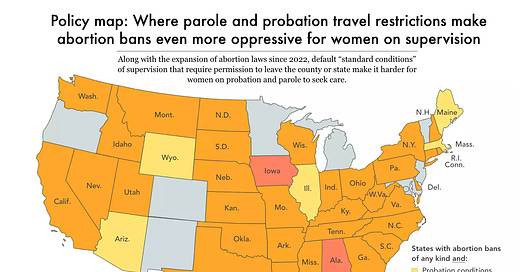Antiabortion regulations harm rights of criminally accused and convicted
People on parole often have travel restrictions, which prevent them from getting abortion care in other states
The rights of the criminally accused and convicted have long been a concern for liberals. Fighting for their reproductive rights is part of that.
Recently, the Prison Policy Initiative, an organization that focuses on the dangers of mass criminalization, published an article on its website that detailed what pregnant people in prison and on parole have to deal with. Much of it is things that get lost in conversations about abortion restrictions.
People on parole are limited in their ability to travel by the conditions of their release. They must get permission, which can be tricky when they are in a situation where they want to get an abortion.
Wanda Bertram, spokeswoman for the initiative, explained what the research shows.
“It's a scary situation, and I think no one would want to be in it,” Bertram said.
Like many other aspects, imprisoned and paroled people weren’t considered when abortion bans were put in place. The initiative’s key findings were as follows:
Over half (53%) of women on probation and parole live in the 21 states that the Times identified as banning abortion care at an earlier point than the standard set by Roe v. Wade (i.e., the highly variable point of “fetal viability”). Less than 3% of these women can travel across state lines without permission.
Nearly one-third (31%) of all women on probation and parole live in states that now have a total abortion ban. Of these, just 4% have no standard condition restricting travel.
Another 17% of women on community supervision live in states that ban abortions at six weeks — a point at which more than 1 in 4 women are not yet aware of their pregnancy.
Only 16% live in places without abortion bans and can access abortion care at any gestational point without crossing state lines.
One of the self-evident problems would be the political beliefs of the parole officer. Were he or she antiabortion, they would be far less likely to grant travel for abortions to the person under the supervision.
“Those are the people, and those are the officers that I'd be really worried about if I was someone who was seeking abortion care because that's someone who's going to assume the worst and may already be trying to exert the maximum amount of control over me and my situation,” Bertram said.
It may also be difficult for paroled people to challenge a decision by their supervising officer. They can sue, but that can be a lengthy process, which would complicate their abortion care or make it impossible. The grounds on which to sue would also be questionable because the laws in those states grant parole officers the ability to choose when to permit travel.
“I don't know what the legal pathway is,” Bertram said. “I don't know what the argument would be for that right in a state where that’s a standard condition of parole or probation. It's up to the officer whether someone can leave or not. Those officers have a lot of discretion.”
For more information on the study, I have included a link here.




